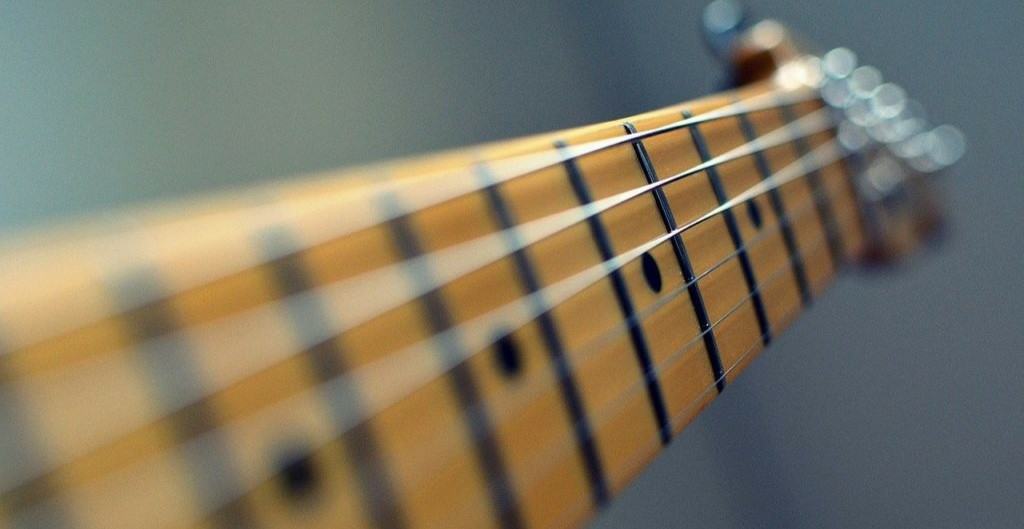There are three types of bass and electric guitar strings:
- Pure Nickel
- Nickel-Wound (Nickel-Plated)
- Steel
The type of material that the strings are made from affects the tone quite considerably. In this article I’ll compare these three types directly so you can decide which to put on your guitar.
It’s important to note that these differences are only relevant for the low E, A and D strings which are wrapped in either pure nickel, plated nickel or steel on an electric guitar. The G, B, and high E strings are typically not wrapped in any material, so it’s just the steel core (that is present on all types of strings) that you’re hearing. On bass guitars all the strings are wound in an outer material.
| Nickel Strings | Nickel Wound Strings | Steel Strings |
| Nickel outer material | 92% steel and 8% nickel outer material | Steel outer material |
| Warm and mellow tone | Balanced tone | Bright and focused tone |
| Lower output | Balanced output | Higher output |
| Good for jazz and blues | Very versatile | Good for rock and metal |
| Lowest friction and tension | Moderate friction and tension | Highest friction and tension |
| Least durable | Moderately durable | More durable |
| Least fret wear | Moderate fret wear | Most fret wear |
| Less expensive | Moderate price | More expensive |

Pure Nickel Strings
Pure nickel strings are made from a steel core wrapped in nickel. This is a tad confusing given that they’re named “pure nickel” strings, but this just refers to the outer material that actually comes into contact with your pick.
The reason why the core is also not made from nickel is because it is actually a very soft metal and does not have enough tension to function properly as a guitar string. Hence, the steel core helps to provide more strength and integrity.
Pure nickel strings sound:
- Have a warm and mellow
- More bass-emphasis and less treble and mid-range
Examples of pure nickel strings include:
- D’Addario Pure Nickel
- Ernie Ball Classic Slinky Pure Nickel
Image links to Amazon
Nickel-Wound Strings
Nickel wound strings are also known as nickel plated strings. Like pure nickel strings, they also have a steel core, however the outer material is different.
Nickel wound strings have an outer material that consists mainly of steel and a small amount of nickel. Typically the ratio is 8% nickel and 92% steel.
The result of having this mixture of steel and nickel is that it provides more tension compared to pure nickel. This also has an effect on the tone.
Nickel-wound strings sound:
- Bright and snappy
- Have more mid-range/ treble emphasis and less bass emphasis that pure-nickel strings
Examples of nickel-wound strings include:
- Ernie Ball Slinky
- Jim Dunlop Performance+
Image links to Amazon
Steel Strings
The final type of electric guitar strings are pure steel. These consist of a steel core and also have an outer coating of steel as well. This means they have the highest tension compared to pure nickel and nickel-wound strings.
Steel strings sound:
- Very bright and crisp
- Have more treble emphasis and less bass emphasis that nickel-wound and pure-nickel strings
Examples of steel strings include:
- Ernie Ball Stainless Steel Slinky
- D’Addario Pro Steels
Image links to Amazon
Tone Comparison
Now we’ve been through a quick overview of the different types of electric guitar strings, let’s get into the direct comparisons, starting with the tone.
Pure nickel strings sound the warmest, followed by nickel-plated strings and finally steel strings sound the brightest. Steel adds some extra brightness and treble emphasis compared to nickel which sounds warmer as it has more bass emphasis.
Steel strings also react more strongly with the pickups magnetic field, resulting in a slightly higher output which means more volume and distortion.
Stainless steel strings are typically best suited to rock and metal, whereas pure nickel strings are often favoured for blues, jazz and country. Nickel-wound strings are the most versatile and work for pretty much every style of music, making them the most popular choice in the guitar industry.
It’s also worth noting that pure nickel strings tend to sound the same for a longer period of time compared to nickel-wound and steel strings. Pure nickel strings already sound “broken in” with their warmer and more mellow tone. Steel strings on the other hand will lose some of their brightness over time and the difference between a brand-new set and a broken-in set will be far more noticeable.

Check out this YouTube video comparing pure nickel and stainless steel strings.
Differences in Feel
It’s not only the tone which differs between these three types of strings, but also the actual feel of them as well.
- Steel strings feel stiffer than nickel-wound and pure-nickel strings
- Steel strings feel rougher than nickel-wound and pure nickel strings
It’s very much a personal preference as to which you’ll prefer the feel of.
As with the other points mentioned, nickel-plated strings offer a compromise between pure nickel and steel strings, which is one of the reasons why they’re so popular.
String Durability
Stainless steel strings last the longest, followed by nickel-plated strings and finally pure nickel strings are the least durable.
Steel strings are harder, which means they are less likely to wear as quickly. Stainless steel also has anti-corrosive properties which help to improve the durability as well. Nickel on the other hand is a softer metal than steel so they will wear out more quickly and need replacing more frequently.
Fret Wear
The frets on a guitar can either be made from nickel or steel. We already know that steel string as the hardest, followed by nickel-wound and finally pure nickel. This same trend is true for the frets as well.
Using steel strings will cause the frets to wear slightly faster than using nickel strings. This rate of wear will be excelled if your guitar also has nickel frets as they are softer compared to steel frets.
It can many years though of playing steel strings over nickel frets to notice any damage to the frets, however if you are concerned about fret wear, then you may want to go with nickel strings instead.
Here are some more articles you might find useful:



